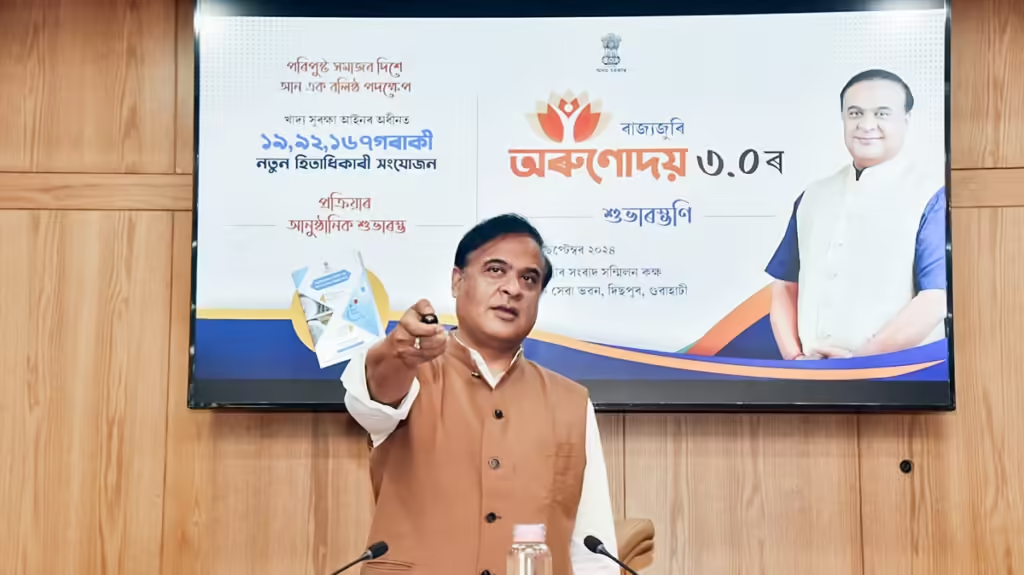The Orunodoi scheme, launched by the Assam government under the leadership of Chief Minister Himanta Biswa Sarma, has rapidly emerged as a national model for welfare programs. Focused on providing financial assistance to women and economically vulnerable families, the scheme has transformed lives across Assam. With its success, other states are now looking at Orunodoi as a blueprint for their welfare initiatives.
What is the Orunodoi Scheme?
Launched in December 2020, the Orunodoi scheme is one of the flagship welfare initiatives of the Assam government. The primary aim of the scheme is to provide monthly financial assistance to economically disadvantaged families, focusing on empowering women. Each beneficiary receives a monthly amount of ₹1,250, which is directly credited to their bank accounts. This sum is intended to help families meet their essential needs, such as purchasing medicines, food, and other basic necessities.
The scheme was designed with a clear focus on women, as the financial assistance is credited to the bank accounts of female household members. This ensures that women have greater control over household finances, thereby fostering financial independence and empowerment.
Objectives of the Orunodoi Scheme
The Orunodoi scheme was conceived with several objectives aimed at improving the socio-economic conditions of Assam’s most vulnerable families:
- Poverty Alleviation: The scheme provides direct financial support to poor households, helping them meet their basic needs and lifting them out of poverty.
- Women’s Empowerment: By channeling the funds directly to women, the scheme promotes financial inclusion and independence for women, empowering them to make financial decisions within their families.
- Improved Healthcare Access: A portion of the financial assistance is intended for the purchase of medicines, ensuring that families can afford essential healthcare.
- Nutritional Support: The funds can be used to buy essential food items, thereby addressing issues of malnutrition and food security in economically disadvantaged households.
- Economic Development: The infusion of money into economically weaker sections stimulates local economies by increasing purchasing power and driving demand for goods and services.
Since its launch, the Orunodoi scheme has had a far-reaching impact on families across Assam, particularly those living below the poverty line. By providing a steady source of income, the scheme has improved the living conditions of over 24 lakh households.
- Financial Stability for Families: The direct financial aid has enabled families to manage their daily expenses better. With a reliable source of monthly income, households can now afford essential commodities, including healthcare, groceries, and education.
- Reduction in Gender Inequality: By targeting women as the direct beneficiaries, the Orunodoi scheme has significantly contributed to reducing gender disparities in household decision-making. Women, who often lacked financial independence, now have a greater role in managing family resources.
- Improved Healthcare Access: With the specific allocation of funds for purchasing medicines, many families are now able to afford medical treatment for chronic diseases, which was previously a financial burden.
- Economic Boost: The financial assistance provided through the scheme has helped boost local economies by increasing demand for essential goods and services. This, in turn, has created a positive cycle of economic activity and growth at the grassroots level.
Chief Minister Himanta Biswa Sarma has repeatedly highlighted the transformative power of the Orunodoi scheme. According to Sarma, the scheme represents a “lifeline” for many families in Assam, giving them the financial stability they need to lead a dignified life.
Under Sarma’s leadership, the Assam government has expanded the scheme to include more beneficiaries, with a long-term vision of reaching every vulnerable household in the state. The government has also streamlined the application and disbursement processes, ensuring that the benefits reach the right people efficiently and transparently.
Orunodoi as a National Model
The success of the Orunodoi scheme has garnered attention at the national level, with many states considering adopting similar models. The scheme’s unique approach of empowering women financially, coupled with its direct benefit transfer (DBT) mechanism, has been praised for its efficiency and transparency.
Several aspects of Orunodoi make it an exemplary model for other welfare programs:
- Targeted Assistance: The scheme focuses on women and vulnerable families, ensuring that financial aid reaches those who need it most. This targeted approach minimizes the chances of misuse or exclusion.
- Direct Benefit Transfer (DBT): The use of DBT ensures that there is no middleman, reducing the risk of corruption and delays in disbursement. This system also provides accountability and transparency in the entire process.
- Sustainable Financial Support: The monthly financial assistance provided under the scheme ensures continuous support for the beneficiaries, rather than one-time aid, which often fails to address long-term issues of poverty.
- Women-Centric Approach: Orunodoi’s focus on women as the primary beneficiaries has proven to be an effective tool for gender empowerment, a feature that many other states could replicate.
With the scheme’s continued success, the Assam government plans to further expand its coverage and improve its effectiveness. New initiatives, such as incorporating skill development programs for women beneficiaries, are being considered to make the scheme more holistic. Himanta Biswa Sarma envisions the Orunodoi scheme becoming a long-term solution to poverty alleviation in Assam, while also serving as a guiding framework for other states and the central government.
The Orunodoi scheme, spearheaded by Assam’s Chief Minister Himanta Biswa Sarma, has evolved into a national model for welfare programs. By focusing on financial assistance for economically disadvantaged families, particularly women, the scheme has made a significant difference in the lives of millions in Assam. With its transparent execution and targeted approach, Orunodoi is paving the way for other states to adopt similar welfare models that prioritize gender empowerment, poverty alleviation, and sustainable economic growth.

